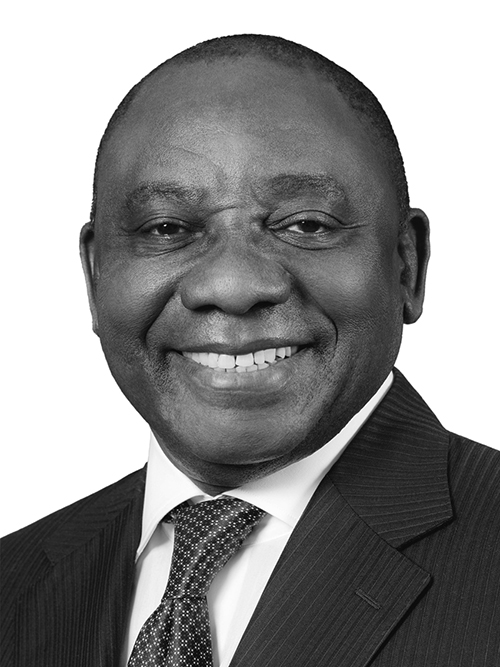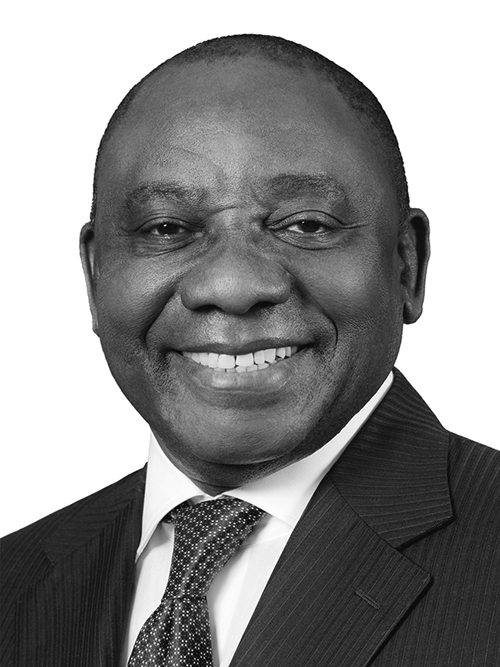Programme Director,
Minister of Human Settlements, Ms Thembisile Simelane,
Ministers and Deputy Ministers,
Premiers,
Leaders of industry, labour and civil society,
Representatives of academia, research institutions and professional bodies,
Development finance partners,
Guests,
Ladies and gentlemen,
Good Morning.
It is a great pleasure to address this critical gathering, which places the built environment at the centre of human development.
The right to adequate housing is a basic human right, reflected both in the Universal Declaration of Human Rights and in our own Constitution.
Having shelter that provides privacy, safety and freedom is inextricably bound to human dignity.
Housing is not merely about shelter, but it is about belonging, security and opportunity.
South Africa, like many countries in the world, faces a growing demand for housing.
Since 1994, the democratic Government has been able to provide more than 5 million housing opportunities.
This achievement stands among the most ambitious social programmes on our continent. It has transformed millions of lives.
Yet, despite this progress, more than 2.5 million families are today still on the waiting list for housing throughout the country.
Inadequate supply, limited land availability, rising construction costs and delays in project delivery are all contributing to a situation of scarcity.
This has a number of consequences.
For the middle class, prices and rents are being pushed upwards.
For the poor, homelessness and the proliferation of informal settlements are exacerbating already dire conditions.
The delivery of basic services to unplanned settlements is stretching the capacity and the resources of the State.
Rapid urbanisation, population growth, migration and climate change are reshaping our human settlements on an unprecedented scale.
It is estimated that by 2050, nearly eight out of every ten South Africans will live in cities.
Many will live in informal settlements, often located on land vulnerable to floods, drought, heat stress and environmental degradation.
In recent years, many parts of our country have borne the brunt of climate change.
It is always the poorest and most vulnerable who suffer first and who suffer most.
If we continue to build in the old way – on the same land, with the same vulnerabilities, using the same methods – then we are not solving the housing challenge.
We must make a change.
We must embrace the tide of technological progress to future-proof human settlements.
This is a social imperative and an economic necessity.
The right to adequate housing must not be the sole privilege of those with money. It is an aspiration for all that our Constitution compels us to progressively realise.
This Summit has been convened because it is time to think differently.
We have to think beyond traditional brick-and-mortar.
We must embrace technological solutions that enable housing to be delivered faster, better and at scale.
This Summit brings together Government, regulators, financiers, innovators, municipalities, professional bodies, community organisations, youth formations and international partners in support of modernising human settlements.
We are united in our resolve to turn innovation into a coordinated national pathway for housing delivery at scale.
We are learning from global experience while building solutions that are locally embedded, socially accepted and owned by our people.
At the G20 Leaders’ Summit held in Johannesburg in November last year, South Africa reaffirmed a principle that now defines leadership in the 21st Century.
We said that resilience is not merely the ability to recover. It is the foresight to prepare.
Resilience is about choices made before disaster strikes.
It is about building systems that protect lives, conserve resources and endure over time.
Resilient human settlements require such foresight.
Buildings are among the world’s largest sources of carbon emissions and resource consumption.
Traditional construction methods, while familiar and trusted, are no longer sustainable on their own.
Water scarcity, rising energy costs, climate risk and the urgency of scale demand that we modernise how we build.
Innovative building technologies offer us a strategic opportunity.
When appropriately regulated, financed, socially accepted and locally embedded, innovative building technologies allow us to build faster and at scale.
They enable us to reduce carbon emissions and water use, improve energy efficiency, and enhance durability and quality.
Innovative building technologies are an essential part of a diversified, modern construction system capable of meeting today’s challenges.
In South Africa, innovation in construction takes place within an established regulatory framework.
Agrément South Africa provides rigorous scientific and technical certification of innovation systems while the National Home Builders Registration Council safeguards quality, compliance and consumer protection during implementation.
Together, these institutions ensure that innovation strengthens public trust.
Innovation without standards erodes confidence, while innovation with oversight builds legitimacy.
The 2024 White Paper on Human Settlements provides the policy foundation for the innovative shift we need to make.
It calls for resilient building typologies, sustainable local materials, rapid emergency housing responses and stronger partnerships across society.
At the heart of this Summit is a Social Compact on Innovative Building Technologies.
This Compact represents a shared national commitment to move innovative building technologies from pilot projects and demonstrations into the mainstream of South Africa’s human settlements.
The Compact aligns policy and planning, regulation and standards, finance and insurance, research and skills development, and implementation across all spheres of Government.
Most importantly, it establishes shared responsibility and accountability.
The Innovative Building Technologies Programme focuses on areas where impact is most urgent.
These areas include disaster recovery and emergency housing, climate-resilient settlements, energy-efficient and water-saving technologies, and local manufacturing and supply chains.
Scaling innovation requires confidence from financiers and insurers.
Through the Social Compact, Government, development finance institutions, banks and insurers have committed to align funding instruments, de-risk these projects, and recognise certified IBT housing as financeable and insurable assets.
Without this alignment, innovation stalls.
As we proceed along this path, we need to address concerns that these innovative building technologies will cost jobs.
We must work together to protect jobs. We must draw on the international experience that shows that innovation does not eliminate work, but rather transforms it.
International experience shows bricklayers becoming technicians, contractors becoming manufacturers, and communities becoming producers, not just beneficiaries.
Innovative building technologies enable us to align housing delivery with technical training, artisan development, digital skills and local manufacturing.
Through this, we must provide opportunities for young people in particular to learn and to work.
We must use this transition to address the persistent exclusion of women from the built environment sector.
Through targeted procurement, access to finance and support for women-owned enterprises and cooperatives, innovative building technologies can create space for women as entrepreneurs, innovators and leaders.
Inclusion must also be built into the design of our settlements.
For persons with disabilities, housing is about access, independence and dignity.
Innovative building technologies allow universal design principles to be integrated from the outset, not retrofitted as an afterthought.
This Summit is a commitment to action.
The Social Compact will guide coordinated implementation, supported by structured governance, monitoring and accountability.
Delivery is now the measure of our seriousness.
Resilience is the difference between recovery and repeated loss, between dignity and displacement, between success and failure.
We have the technology to build for the present and to be prepared for the future.
Now we need leadership. We need partnerships.
We need to be creative.
We need to build faster and better.
Let us work together to build a resilient, inclusive South Africa which is a home to all our people, and in which all our people have a decent home.
I thank you.











